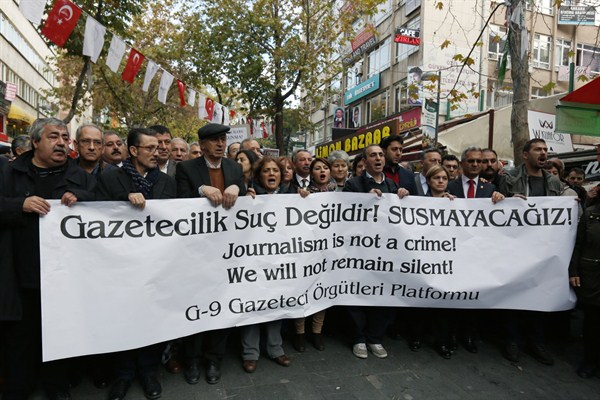On Nov. 26, the editor-in-chief and the Ankara bureau chief of Cumhuriyet, Turkey’s oldest newspaper, were detained on the grounds that they had “divulged state secrets” after they published articles and videos alleging that Turkey’s intelligence agency smuggled weapons to jihadists in Syria. The editor-in-chief, Can Dundar, had been scheduled to speak at a conference on press freedom in the Middle East at Boston College. He decided at the last minute not to attend, “for fear something might happen at Cumhuriyet while he was gone,” as one of the conference organizers told me.
His fears were not unfounded. Turkish Prime Minister Recep Tayyip Erdogan himself had warned that Cumhuriyet and Dundar would pay for their stories on weapons smuggling. Moreover, the organizers of the Boston College conference were affiliated with the Gulen movement, formerly a fervent supporter of Erdogan and his Justice and Development Party, known as the AKP, but which has become an equally fervent opposition force since breaking with Erdogan in 2013. And days before Turkey’s Nov. 1 election, police, acting to investigate charges of “terror propaganda,” had forcibly seized a major Gulen-affiliated company and put new editors in charge of its media assets. Literally overnight, the company’s newspaper, Bugun, went from attacking the government to praising it. Accordingly, more than a few of the Turkish participants at the conference had already left Turkey, fearing arrest. Dundar stayed there and saw those fears realized.
Such attacks on free speech are par for the course in Turkey. One notorious example was Turkey’s blanket blocking of YouTube from 2008 to 2010, in response to videos deemed insulting to modern Turkey’s first leader, Mustafa Kemal Ataturk. Insulting Ataturk is a criminal offense in Turkey, and the ban was lifted only after the videos were removed. On Dec. 1, the European Court of Human Rights (ECHR) ruled that the ban had violated the right to free expression protected under Article 10 of the European Convention on Human Rights, to which Turkey is a signatory. The ECHR’s ruling, however, only addressed a previous version of the Turkish law regulating Internet content. Since the YouTube ban ended in 2010, the law has been revised several times to legalize the blanket blocking of entire domains on the grounds that they threaten national security or public order.

